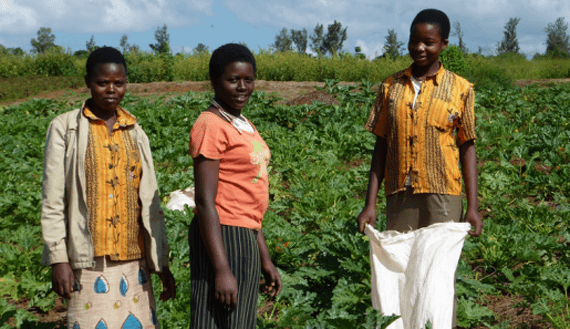
Co-operatives are key to increasing food security in Rwanda, helping small-farmers to cope with challenges and enabling them to gain access to markets.
Emmanuelle Mashayo, the Coordinator for Purchase for Progress (P4P) within UN's World Food Programme (WFP) in Rwanda, highlighted the challenges faced by farmers and the important role played by agricultural co-operatives in food security.
The most densely populated country in Africa, with more than 1,000 people per square kilometre, Rwanda has been devastated by recent floods and farmers fear the poor harvest could determine a food crisis. Price volatility, climate change, scarcity of land and lack of training are just some of the challenges faced by many small farmers across the state.
Co-operatives empower small-scale producers by enabling them to face these challenges together. Co-ops also enable farmers to join their pieces of land and achieve large-scale farming. In this way, they are also better prepared to fight soil erosion in the land.
“The government has invested in a number of programmes to reclaim marshlands, terracing and hillside irrigation so as to increase area of production. These reclaimed lands are usually given to smallholder farmers through co-operatives for crop cultivation. In this case co-operatives are managing the land use on behalf of the members,” explained Ms Mashayo.
She added that through the Crop Intensification Programme (CIP), the Ministry of Agriculture and its partners use co-operatives as a vehicle for the distribution of improved seeds and fertilisers to farmers. According to Ms Mashayo it is not uncommon to have an agronomist within a co-operative, especially those co-operatives that grow priority crops. This has led to an increase in productivity, especially in maize.
Co-operatives are also used by the government and NGOs to extend training and other capacity building initiatives. She added: “WFP through the P4P initiative has used co-operative structures to build capacity in post harvest handling techniques as well as commodity (maize and beans) quality. To date not only has post harvest losses reduced significantly, but Rwanda has also become one of the top countries in East African Community with high quality maize, which has improved market opportunities for the smallholder farmers.“
Some co-operatives offer services to members as a way of building their capacity. Farmers can receive training on production techniques and post harvest, as well as literacy training, or business and marketing building workshops.
With access to market being one of the most difficult challenges faced by small farmers in Rwanda, the role of co-operatives in helping them to exercise economies of scale is increasingly important. Through co-operatives, farmers can attract traders and institutional buyers, including the P4P, and increase their negotiating power.
Ms Mashayo added that co-ops have also started to emerge in other sectors such as transport or commodity transformation, with people buying trucks and milling machines and starting their own enterprises. “These new activities benefit the communities through employment creation as well as service provision. This creates more income within the community and enhances food security,” concluded the Coordinator for Purchase for Progress.
Photo: Rwandan farmers (c) CTB/Josiane Droeghag.




